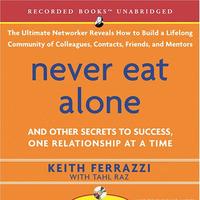10. CHAPTER 2 - Don't Keep Score
A network functions precisely because there's recognition of mutual need.
There's an implicit understanding that investing time and energy in building personal relationships with the right people will pay dividends. The majority of "one percenters," as I call the ultra-rich and successful whom many of my mentees aspire toward, are one percenters because they understand this dynamic—because, in fact, they themselves used the power of their network of contacts and friends to arrive at their present station. But to do so, first you have to stop keeping score.
You can't amass a network of connections without introducing such connections to others with equal fervor. The more people you help, the more help you'll have and the more help you'll have helping others. It's like the Internet. The more people who have access, and use it, the more valuable the Internet becomes. I now have a small army of former mentees, succeeding in any number of industries, helping me to mentor the young people that come to me today. This is not softhearted hokum; it's an insight that hard-headed business people would do well to take seriously.
We live in an interdependent world. Flattened organizations seek out strategic alliances at every turn. A growing pool of free agents are finding they need to work with others to accomplish their goals. More than ever before, zero-sum scenarios where only one party wins often mean, in the long run, that both parties will lose. Win/win has become a necessary reality in a networked world. In a hyperconnected marketplace, cooperation is gaining ground on competition. The game has changed.
In 1956, William Whyte's bestselling book The Organization Man outlined the archetypal American worker: We donned our gray suit for a large corporation, offering our loyalty in exchange for job security.
It was glorified indentured servitude, with few options and few opportunities. Today, however, employers offer little loyalty, and employees give none. Our careers aren't paths so much as landscapes that are navigated. We're free agents, entrepreneurs, and intrapreneurs—each with our own unique brand. Many people have adapted to these new times with the belief that it's still a dog-eat-dog world, where the meanest, baddest dog in the neighborhood wins.
But nothing could be further from the truth. Where employees once found generosity and loyalty in the companies we worked for, today we must find them in a web of our own relationships.
It isn't the blind loyalty and generosity we once gave to a corporation. It's a more personal kind of loyalty and generosity, one given to your colleagues, your team, your friends, your customers. Today, we need each other more than ever.
Sadly, plenty of people still function as if it were 1950.
We have a tendency to romanticize independence. Most business literature still views autonomy as a virtue, as though communication, teamwork, and cooperation were lesser values. To such thinkers, interdependence is just a variation of outright dependence. In my experience, such a view is a career-killer. Autonomy is a life vest made out of sand.
Independent people who do not have the skills to think and act interdependently may be good individual producers, but they won't be seen as good leaders or team players. Their careers will begin to stutter and stall before too long.

